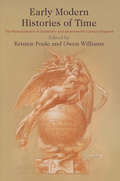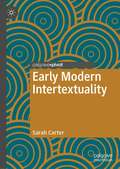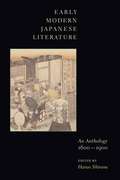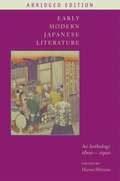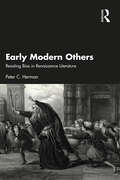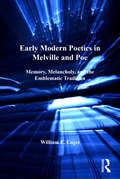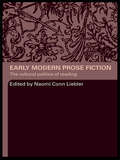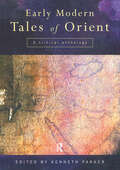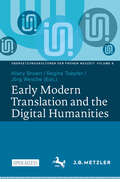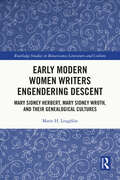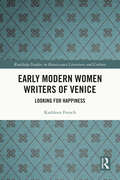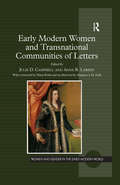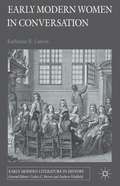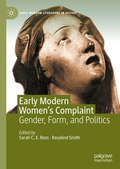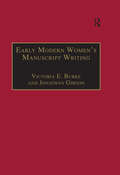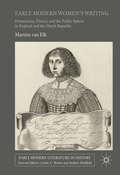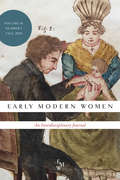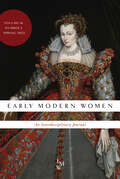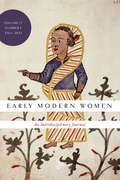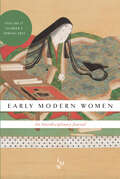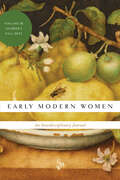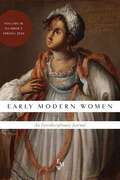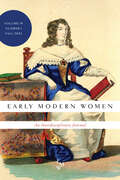- Table View
- List View
Early Modern Histories of Time: The Periodizations of Sixteenth- and Seventeenth-Century England
by Kristen Poole Owen WilliamsEarly Modern Histories of Time examines how a range of chronological modes intrinsic to the sixteenth and seventeenth centuries shaped the thought-worlds of those living during this time and explores how these temporally indigenous models can productively influence our own working concepts of historical period. This innovative approach thus moves beyond debates about where we should divide linear time (and what to call the ensuing segments) to reconsider the very concept of "period." Bringing together an eminent cast of literary scholars and historians, the volume develops productive historical models by drawing on the very texts and cultural contexts that are their objects of study. What happens to the idea of "period" when English literature is properly placed within the dynamic currents of pan-European literary phenomena? How might we think of historical period through the palimpsested nature of buildings, through the religious concept of the secular, through the demographic model of the life cycle, even through the repetitive labor of laundering? From theology to material culture to the temporal constructions of Shakespeare, and from the politics of space to the poetics of typology, the essays in this volume take up diverse, complex models of sixteenth- and seventeenth-century temporality and contemplate their current relevance for our own ideas of history. The volume thus embraces the ambiguity inherent in the word "contemporary," moving between our subjects' sense of self-emplacement and the historiographical need to address the questions and concerns that affect us today.Contributors: Douglas Bruster, Euan Cameron, Heather Dubrow, Kate Giles, Tim Harris, Natasha Korda, Julia Reinhard Lupton, Kristen Poole, Ethan H. Shagan, James Simpson, Nigel Smith, Mihoko Suzuki, Gordon Teskey, Julianne Werlin, Owen Williams, Steven N. Zwicker.
Early Modern Intertextuality (Early Modern Literature in History)
by Sarah CarterThis book is an exploration of the viability of applying the post structuralist theory of intertextuality to early modern texts. It suggests that a return to a more theorised understanding of intertextuality, as that outlined by Julia Kristeva and Roland Barthes, is more productive than an interpretation which merely identifies ‘source’ texts. The book analyses several key early modern texts through this lens, arguing that the period’s conscious focus on and prioritisation of the creative imitation of classical and contemporary European texts makes it a particularly fertile era for intertextual reading. This analysis includes discussion of early modern creative writers’ utilisation of classical mythology, allegory, folklore, parody, and satire, in works by William Shakespeare, Sir Francis Bacon, John Milton, George Peele, Thomas Lodge, Christopher Marlowe, Francis Beaumont, and Ben Jonson, and foregrounds how meaning is created and conveyed by the interplay of texts and the movement between narrative systems. This book will be of interest to undergraduate and postgraduate students of early modern literature, as well as early modern scholars.
Early Modern Japanese Literature: An Anthology, 1600-1900
by Haruo ShiraneThis is the first anthology ever devoted to early modern Japanese literature, spanning the period from 1600 to 1900, known variously as the Edo or the Tokugawa, one of the most creative epochs of Japanese culture. This anthology, which will be of vital interest to anyone involved in this era, includes not only fiction, poetry, and drama, but also essays, treatises, literary criticism, comic poetry, adaptations from Chinese, folk stories and other non-canonical works. Many of these texts have never been translated into English before, and several classics have been newly translated for this collection. Early Modern Japanese Literatureintroduces English readers to an unprecedented range of prose fiction genres, including dangibon (satiric sermons), kibyôshi (satiric and didactic picture books), sharebon (books of wit and fashion), yomihon (reading books), kokkeibon (books of humor), gôkan (bound books), and ninjôbon (books of romance and sentiment). The anthology also offers a rich array of poetry -- waka, haiku, senryû, kyôka, kyôshi -- and eleven plays, which range from contemporary domestic drama to historical plays and from early puppet theater to nineteenth century kabuki. Since much of early modern Japanese literature is highly allusive and often elliptical, this anthology features introductions and commentary that provide the critical context for appreciating this diverse and fascinating body of texts. One of the major characteristics of early modern Japanese literature is that almost all of the popular fiction was amply illustrated by wood-block prints, creating an extensive text-image phenomenon. In some genres such as kibyôshi and gôkan the text in fact appeared inside the woodblock image. Woodblock prints of actors were also an important aspect of the culture of kabuki drama. A major feature of this anthology is the inclusion of over 200 woodblock prints that accompanied the original texts and drama.
Early Modern Japanese Literature: An Anthology, 1600-1900
by Haruo ShiraneThis abridged edition of Haruo Shirane's popular anthology, Early Modern Japanese Literature, retains the essential texts that have made the original volume such a valuable resource. The book introduces English-speaking readers to prose fiction genres, including dangibon, kibyoshi (satiric picture books), sharebon (books of wit and fashion), yomihon, kokkeibon (books of humor), gokan (bound books), and ninjobon (books of romance and sentiment). It also features poetic genres such as waka, haiku, senryu, and kyoka, and plays ranging from Chikamatsu's puppet plays to nineteenth-century kabuki. <p><p> Readers will continue to benefit from the anthology's selection of significant essays, treatises, literary criticism, folk stories, and other noncanonical works, as well as the numerous prints that accompanied these works. They will also find Shirane's introductions and critical commentary, which guide the reader through the allusive and often elliptical nature of these incredible selections.
Early Modern Japanese Literature: An Anthology, 1600-1900 (Translations from the Asian Classics)
by Haruo ShiraneThis is the first anthology ever devoted to early modern Japanese literature, spanning the period from 1600 to 1900, known variously as the Edo or the Tokugawa, one of the most creative epochs of Japanese culture. This anthology, which will be of vital interest to anyone involved in this era, includes not only fiction, poetry, and drama, but also essays, treatises, literary criticism, comic poetry, adaptations from Chinese, folk stories and other non-canonical works. Many of these texts have never been translated into English before, and several classics have been newly translated for this collection.Early Modern Japanese Literature introduces English readers to an unprecedented range of prose fiction genres, including dangibon (satiric sermons), kibyôshi (satiric and didactic picture books), sharebon (books of wit and fashion), yomihon (reading books), kokkeibon (books of humor), gôkan (bound books), and ninjôbon (books of romance and sentiment). The anthology also offers a rich array of poetry—waka, haiku, senryû, kyôka, kyôshi—and eleven plays, which range from contemporary domestic drama to historical plays and from early puppet theater to nineteenth century kabuki. Since much of early modern Japanese literature is highly allusive and often elliptical, this anthology features introductions and commentary that provide the critical context for appreciating this diverse and fascinating body of texts.One of the major characteristics of early modern Japanese literature is that almost all of the popular fiction was amply illustrated by wood-block prints, creating an extensive text-image phenomenon. In some genres such as kibyôshi and gôkan the text in fact appeared inside the woodblock image. Woodblock prints of actors were also an important aspect of the culture of kabuki drama. A major feature of this anthology is the inclusion of over 200 woodblock prints that accompanied the original texts and drama.
Early Modern Others: Resisting Bias in Renaissance Literature
by Peter C. HermanEarly Modern Others highlights instances of challenges to misogyny, racism, atheism, and antisemitism in the early modern period. Through deeply historicizing early modern literature and looking at its political and social contexts, Peter C. Herman explores how early modern authors challenged the biases and prejudices of their age. By examining the works of Thomas More, William Shakespeare, Christopher Marlowe, John Fletcher, and Philip Massinger amongst others, Herman reveals that for every “-ism” in early modern English culture there was an “anti-ism” pushing back against it. The book investigates “others” in early modern literature through indigenous communities, women, religion, people of color, and class. This innovative book shows that the early modern period was as complicated and as contradictory as the world today. It will offer valuable insight for anyone studying early modern literature and culture, as well as social justice and intersectionality.
Early Modern Playhouse Manuscripts and the Editing of Shakespeare
by Paul WerstineEarly Modern Playhouse Manuscripts and the Editing of Shakespeare argues for editing Shakespeare's plays in a new way, without pretending to distinguish authorial from theatrical versions. Drawing on the work of the influential scholars A. W. Pollard and W. W. Greg, Werstine tackles the difficult issues surrounding 'foul papers' and 'promptbooks' to redefine these fundamental categories of current Shakespeare editing. In an extensive and detailed analysis, this book offers insight into the methods of theatrical personnel and a reconstruction of backstage practices in playhouses of Shakespeare's time. The book also includes a detailed analysis of nineteen manuscripts and three quartos marked up for performance - documents that together provide precious insight into how plays were put into production. Using these surviving manuscripts as a framework, Werstine goes on to explore editorial choices about what to give today's readers as 'Shakespeare'.
Early Modern Poetics in Melville and Poe: Memory, Melancholy, and the Emblematic Tradition
by William E. EngelBringing to bear his expertise in the early modern emblem tradition, William E. Engel traces a series of self-reflective organizational schemes associated with baroque artifice in the work of Herman Melville and Edgar Allan Poe. While other scholars have remarked on the influence of seventeenth-century literature on Melville and Poe, this is the first book to explore how their close readings of early modern texts influenced their decisions about compositional practice, especially as it relates to public performance and the exigencies of publication. Engel's discussion of the narrative structure and emblematic aspects of Melville's Piazza Tales and Poe's "The Raven" serve as case studies that demonstrate the authors' debt to the past. Focusing principally on the overlapping rhetorical and iconic assumptions of the Art of Memory and its relation to chiasmus, Engel avoids engaging in a simple account of what these authors read and incorporated into their own writings. Instead, through an examination of their predisposition toward an earlier model of pattern recognition, he offers fresh insight into the writers' understandings of mourning and loss, their use of allegory, and what they gained from their use of pseudonyms.
Early Modern Prose Fiction: The Cultural Politics of Reading
by Naomi Conn LieblerEmphasizing the significance of early modern prose fiction as a hybrid genre that absorbed cultural, ideological and historical strands of the age, this fascinating study brings together an outstanding cast of critics including: Sheila T. Cavanaugh, Stephen Guy-Bray, Mary Ellen Lamb, Joan Pong Linton, Steve Mentz, Constance C. Relihan, Goran V. Stanivukovic with an afterword from Arthur Kinney. Each of the essays in this collection considers the reciprocal relation of early modern prose fiction to class distinctions, examining factors such as: the impact of prose fiction on the social, political and economic fabric of early modern England the way in which a growing emphasis on literacy allowed for increased class mobility and newly flexible notions of class how the popularity of reading and the subsequent demand for books led to the production and marketing of books as an industry complications for critics of prose fiction, as it began to be considered an inferior and trivial art form. Early modern prose fiction had a huge impact on the social and economic fabric of the time, creating a new culture of reading and writing for pleasure which became accessible to those previously excluded from such activities, resulting in a significant challenge to existing class structures.
Early Modern Tales of Orient: A Critical Anthology
by Kenneth ParkerFirst published in 1999. Routledge is an imprint of Taylor & Francis, an informa company.
Early Modern Translation and the Digital Humanities (Übersetzungskulturen der Frühen Neuzeit #8)
by Hilary Brown Regina Toepfer Jörg WescheThis open-access volume explores how digital resources and methods can be usefully employed for research on early modern translation. The volume focuses mainly on digital resources, and features a number of chapters on translation-specific resources written by members of the teams leading the projects. The resources presented here encompass translations into and/or out of Greek, Latin, the European vernaculars, and Jewish languages (Hebrew, Yiddish, Ladino and Judeo-Italian) and different corpora including plays, encyclopedias, and ‘radical’ texts. While the use of digital methods to analyse early modern translations is still in its early stages, the volume also considers how methods such as data visualisation could shed new light on translation phenomena.
Early Modern Women Writers Engendering Descent: Mary Sidney Herbert, Mary Sidney Wroth, and their Genealogical Cultures (Routledge Studies in Renaissance Literature and Culture)
by Marie H. LoughlinFocusing on Mary Sidney Herbert and Mary Sidney Wroth’s use of the figures of origin, descent, and inheritance in their poetry and prose, this book examines how these central women writers situated themselves in terms of early modern England’s rich ancestral cultures, employing these and other genealogical concepts to talk about authorship, family, selfhood, and memory. In turn, both Sidney Herbert and Sidney Wroth also shaped their works in relation to the ways in which writers within their familial communities and literary coteries constructed them as Sidneys, heirs, descendants, and future ancestors, in genres ranging from the patronage dedication and pastoral eclogue to mythographic genealogia and georgic poetry. In the intersection of ancestry, death, sexuality, and reproduction, the book contends that Sidney Herbert and Sidney Wroth develop their authorship within the simultaneous rigidity and flexibility of their world’s genealogical discourses.
Early Modern Women Writers of Venice: Looking for Happiness (Routledge Studies in Renaissance Literature and Culture)
by Kathleen FrenchEarly Modern Women Writers of Venice: Looking for Happiness explores the ways in which five women used their writing to challenge misogynistic views about female inferiority, develop a sense of agency, and form meaningful interpersonal relationships that would enable them to find happiness. They are the forerunners of later feminist thinkers.This book is the first full-length study of the happiness of women in early modern Italy. It focuses on five women writers who lived in Venice between the late fifteenth century and the early seventeenth century. It takes an interdisciplinary approach that combines methodologies from literature, psychology, philosophy, history, religion, and emotion studies, emphasizing the importance of studying the search for happiness within a specific cultural context. It contributes particularly to feminist studies that consider gender in the context of ideology and the exercise of power. It also engages with current studies of emotions by approaching them from the perspective of research in the field of positive psychology and self-determination theory. It considers how the process of writing enabled women to achieve autonomy, what they thought about happiness, and the extent to which they were able to achieve it in their individual lives.
Early Modern Women and Transnational Communities of Letters (Women and Gender in the Early Modern World)
by Diana Robin Anne R. Larsen Julie D. Campbell Margaret J. M. EzellAn important contribution to growing scholarship on women's participation in literary cultures, this essay collection concentrates on cross-national communities of letters to offer a comparative and international approach to early modern women's writing. The essays gathered here focus on multiple literatures from several countries, ranging from Italy and France to the Low Countries and England. Individual essays investigate women in diverse social classes and life stages, ranging from siblings and mothers to nuns to celebrated writers; the collection overall is invested in crossing geographic, linguistic, political, and religious borders and exploring familial, political, and religious communities. Taken together, these essays offer fresh ways of reading early modern women's writing that consider such issues as the changing cultural geographies of the early modern world, women's bilingualism and multilingualism, and women's sense of identity mediated by local, regional, national, and transnational affiliations and conflicts.
Early Modern Women in Conversation
by Katherine R. LarsonTo converse is, in its most fundamental sense, to engage with society. The potency of conversation as an early modern social networking tool is complicated, however, both by its gendered status in the period and by its conflation of verbal and physical interaction. Conversation was an embodied act that signified social intimacy, cohabitation, and even sexual intercourse. As such, conversation posed a particular challenge for women, whose virtuous reputation was contingent on sexual and verbal self-control. Early Modern Women in Conversation considers how five women writers from the prominent Sidney and Cavendish families negotiated the gendered interrelationship between conversation and the spatial boundaries delimiting conversational encounters to create opportunities for authoritative and socially transformative utterance within their texts. Conversation emerges in this book as a powerful rhetorical and creative practice that remaps women's relationship to space and language inearly modern England.
Early Modern Women's Complaint: Gender, Form, and Politics (Early Modern Literature in History)
by Rosalind Smith Sarah C. E. RossThis collection examines early modern women’s contribution to the culturally central mode of complaint. Complaint has largely been understood as male-authored, yet, as this collection shows, early modern women used complaint across a surprising variety of forms from the early-Tudor period to the late-seventeenth century. They were some of the mode’s first writers, most influential patrons, and most innovative contributors. Together, these new essays illuminate early modern women’s participation in one of the most powerful rhetorical modes in the English Renaissance, one which gave voice to political, religious and erotic protest and loss across a diverse range of texts.This volume interrogates new texts (closet drama, song, manuscript-based religious and political lyrics), new authors (Dorothy Shirley, Scots satirical writers, Hester Pulter, Mary Rowlandson), and new versions of complaint (biblical, satirical, legal, and vernacular). Its essays pay specific attention to politics, form, and transmission from complaint’s first circulation up to recent digital representations of its texts. Bringing together an international group of experts in early modern women’s writing and in complaint literature more broadly, this collection explores women’s role in the formation of the mode and in doing so reconfigures our understanding of complaint in Renaissance culture and thought.
Early Modern Women's Manuscript Writing: Selected Papers from the Trinity/Trent Colloquium
by Jonathan GibsonBecause print publishing was often neither possible nor desirable for women in the early modern period, in order to understand the range of writing by women and indeed women's literary history itself, it is important that scholars consider women's writing in manuscript. Since the body of critical studies on women's writing for the most part prioritizes print over manuscript, this essay collection provides an essential corrective. The essays in this volume discuss many of the ways in which women participated in early modern manuscript culture. The manuscripts studied by the contributors originated in a wide range of different milieux, including the royal Court, the universities, gentry and aristocratic households in England and Ireland, and French convents. Their contents are similarly varied: original and transcribed secular and devotional verse, religious meditations, letters, moral precepts in French and English, and recipes are among the genres represented. Emphasizing the manuscripts' social, political and religious contexts, the contributors challenge commonly held notions about women's writing in English in the early modern period, and bring to light many women whose work has not been considered before.
Early Modern Women's Writing
by Martine Van ElkThis book is the first comparative study of early modern English and Dutch women writers. It explores women's rich and complex responses to the birth of the public sphere, new concepts of privacy, and the ideology of domesticity in the seventeenth century. Women in both countries were briefly allowed a public voice during times of political upheaval, but were increasingly imagined as properly confined to the household by the end of the century. This book compares how English and Dutch women responded to these changes. It discusses praise of women, marriage manuals, and attitudes to female literacy, along with female artistic and literary expressions in the form of painting, engraving, embroidery, print, drama, poetry, and prose, to offer a rich account of women's contributions to debates on issues that mattered most to them.
Early Modern Women: An Interdisciplinary Journal, volume 16 number 1 (Fall 2021)
by Early Modern Women: An Interdisciplinary JournalThis is volume 16 issue 1 of Early Modern Women: An Interdisciplinary Journal. Early Modern Women: An Interdisciplinary Journal (EMW) is the only journal devoted solely to the interdisciplinary and global study of women and gender spanning the late medieval through early modern periods. Each volume gathers essays on early modern women from every country and region by scholars from a wide range of academic disciplines including art history, cultural studies, music, history, languages and literatures, political science, religion, theatre, history of science, and history of philosophy.
Early Modern Women: An Interdisciplinary Journal, volume 16 number 2 (Spring 2022)
by Early Modern Women: An Interdisciplinary JournalThis is volume 16 issue 2 of Early Modern Women: An Interdisciplinary Journal. Early Modern Women: An Interdisciplinary Journal (EMW) is the only journal devoted solely to the interdisciplinary and global study of women and gender spanning the late medieval through early modern periods. Each volume gathers essays on early modern women from every country and region by scholars from a wide range of academic disciplines including art history, cultural studies, music, history, languages and literatures, political science, religion, theatre, history of science, and history of philosophy.
Early Modern Women: An Interdisciplinary Journal, volume 17 number 1 (Fall 2022)
by Early Modern Women: An Interdisciplinary JournalThis is volume 17 issue 1 of Early Modern Women: An Interdisciplinary Journal. Early Modern Women: An Interdisciplinary Journal (EMW) is the only journal devoted solely to the interdisciplinary and global study of women and gender spanning the late medieval through early modern periods. Each volume gathers essays on early modern women from every country and region by scholars from a wide range of academic disciplines including art history, cultural studies, music, history, languages and literatures, political science, religion, theatre, history of science, and history of philosophy.
Early Modern Women: An Interdisciplinary Journal, volume 17 number 2 (Spring 2023)
by Early Modern Women: An Interdisciplinary JournalThis is volume 17 issue 2 of Early Modern Women: An Interdisciplinary Journal. Early Modern Women: An Interdisciplinary Journal (EMW) is the only journal devoted solely to the interdisciplinary and global study of women and gender spanning the late medieval through early modern periods. Each volume gathers essays on early modern women from every country and region by scholars from a wide range of academic disciplines including art history, cultural studies, music, history, languages and literatures, political science, religion, theatre, history of science, and history of philosophy.
Early Modern Women: An Interdisciplinary Journal, volume 18 number 1 (Fall 2023)
by Early Modern Women: An Interdisciplinary JournalThis is volume 18 issue 1 of Early Modern Women: An Interdisciplinary Journal. Early Modern Women: An Interdisciplinary Journal (EMW) is the only journal devoted solely to the interdisciplinary and global study of women and gender spanning the late medieval through early modern periods. Each volume gathers essays on early modern women from every country and region by scholars from a wide range of academic disciplines including art history, cultural studies, music, history, languages and literatures, political science, religion, theatre, history of science, and history of philosophy.
Early Modern Women: An Interdisciplinary Journal, volume 18 number 2 (Spring 2024)
by Early Modern Women: An Interdisciplinary JournalThis is volume 18 issue 2 of Early Modern Women: An Interdisciplinary Journal. Early Modern Women: An Interdisciplinary Journal (EMW) is the only journal devoted solely to the interdisciplinary and global study of women and gender spanning the late medieval through early modern periods. Each volume gathers essays on early modern women from every country and region by scholars from a wide range of academic disciplines including art history, cultural studies, music, history, languages and literatures, political science, religion, theatre, history of science, and history of philosophy.
Early Modern Women: An Interdisciplinary Journal, volume 19 number 1 (Fall 2024)
by Early Modern Women: An Interdisciplinary JournalThis is volume 19 issue 1 of Early Modern Women: An Interdisciplinary Journal. Early Modern Women: An Interdisciplinary Journal (EMW) is the only journal devoted solely to the interdisciplinary and global study of women and gender spanning the late medieval through early modern periods. Each volume gathers essays on early modern women from every country and region by scholars from a wide range of academic disciplines including art history, cultural studies, music, history, languages and literatures, political science, religion, theatre, history of science, and history of philosophy.
